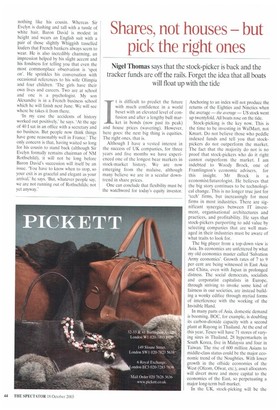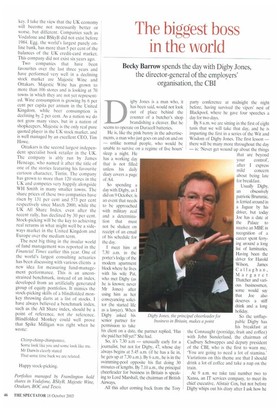Shares, not houses — but pick the right ones
Nigel Thomas says that the stock-picker is back and the tracker funds are off the rails. Forget the idea that all boats will float up with the tide
It is difficult to predict the future with much confidence in a world beset with an elevated level of confusion and after a lengthy bull market in bonds (now past its peak) and house prices (wavering). However, here goes: the next big thing is equities. The right ones, that is.
Although I have a vested interest in the success of UK companies, for three years and five months we have experienced one of the longest bear markets in stock-market history. We are now emerging from the malaise, although many believe we are in a secular downtrend in share prices.
One can conclude that flexibility must be the watchword for today's equity investor.
Anchoring to an index will not produce the returns of the Eighties and Nineties when the average — the average — US stock went up twentyfold. All boats rose on the tide.
Stock-picking is the key now. This is the time to be investing in WalMart, not Kmart. Do not believe those who peddle indexed funds and tell you that stockpickers do not outperform the market. The fact that the majority do not is no proof that stock-pickers who do it right cannot outperform the market. I am indebted to Woody Brock, one of Framlington's economic advisers, for this insight. Mr Brock is a economist/futurologist. He believes that the big story continues to be technological change. This is no longer true just for 'tech' firms, but increasingly for most firms in most industries. There are significant synergies between IT investment, organisational architectures and practices, and profitability. He says that stock-pickers purporting to add value by selecting companies that are well managed in their industries must be aware of what traits to look for.
The big player from a top-down view is Asia. Its economies are unfettered by what my old economics master called 'Salvation Army economics'. Growth rates of 7 to 9 per cent are being witnessed in East Asia and China, even with Japan in prolonged distress. The social democrats, socialists and corporatist capitalists in Europe, through striving to invoke some kind of fairness in our societies, are instead building a wonky edifice through myriad forms of interference with the working of the Invisible Hand.
In many parts of Asia, domestic demand is booming. BOC, for example, is doubling its carbon-dioxide capacity with a second plant at Rayong in Thailand. At the end of this year, Tesco will have 71 stores of varying sizes in Thailand, 28 hypermarkets in South Korea, five in Malaysia and four in Taiwan. The rise of 600 million Asians to middle-class status could be the major economic trend of the Noughties. With lower growth in the offside economies of the West (Ofcom, Ofwat, etc.), asset allocators will divert more and more capital to the economies of the East, so perpetuating a major long-term bull market.
In the UK, stock-picking will be the key. I take the view that the UK economy will become not necessarily better or worse. but different. Companies such as Vodafone and BSkyB did not exist before 1984. Egg. the world's largest purely online bank, has more than 5 per cent of the balances of the UK credit-card market. This company did not exist six years ago.
Two companies that have been favourites over the last three years and have performed very well in a declining stock market are Majestic Wine and Ottakars. Majestic Wine has grown to more than 106 stores and is looking at 70 towns in which they are not yet represented. Wine consumption is growing by 6 per cent per capita per annum in the United Kingdom, while beer consumption is declining by 2 per cent. As a nation we do not grow many vines, but in a nation of shopkeepers. Majestic is the only real pure quoted player in the UK stock market, and is well managed by an excellent CEO. Tim Howe.
Ottakars is the second largest independent specialist book retailer in the UK. The company is ably run by James Heneage, who named it after the title of one of the stories featuring his favourite cartoon character, Tintin. The company has grown to more than 120 stores in the UK and competes very happily alongside WH Smith in many smaller towns. The share prices of these two companies have risen by 131 per cent and 573 per cent respectively since March 2000, while the UK All Share Index, even after the recent rally, has declined by 30 per cent. Stock-picking will be the key to achieving real returns in what might well be a sideways market in the United Kingdom and Europe over the medium term.
The next big thing in the insular world of fund management was reported in the Financial Times earlier this year. One of the world's largest consulting actuaries has been discussing with various clients a new idea for measuring fund-management performance. This is an unconstrained benchmark, instead of an index, developed from an artificially generated group of equity portfolios. It mimics the stock-picking skills of a blindfolded monkey throwing darts at a list of stocks. I have always believed a benchmark index, such as the All Share index, should be a point of reference, not the reference. Blindfolded Monkey could well prove that Spike Milligan was right when he wrote: Chimp-chimp-chimpanzee, Some look like you and some look like me. Mr Darwin clearly stated That some time back we are related.
Happy stock-picking.
Portfolios managed by Framlington hold shares in Vodafone, BSkyB, Majestic Wine, Ottakars, BOC and Tesco.



































































































 Previous page
Previous page